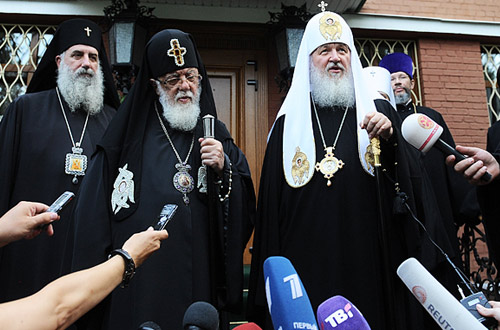| Georgian, Russian Patriarchs Meet in Kiev |
| Civil Georgia, Tbilisi / 27 Jul.'11 / 02:43 |

Russia’s Patriarch Kirill (right) and Georgian Patriarch Ilia II speak with journalist after meeting in Kiev, July 26. Photo: Russian Patriarchate website.
Reiterating Georgian Church's authority over breakaway Abkhazia and South Ossetia, Russian Patriarch Kirill said after meeting with Georgian Orthodox Church leader Ilia II in Kiev, that talks would continue to address "canonical disorder" in those regions.
The two Patriarchs met on July 26 in the Ukrainian capital, where they are participating in the events marking conversion to Christianity of Kievan Rus 1023 years ago.
The Russian Patriarch said after the meeting that "problems" had been discussed, including related to church life in breakaway Abkhazia and South Ossetia.
"We have discussed not easy issues in an atmosphere of brotherly love and peace," Patriarch Kirill told journalists.
"It is absolutely obvious, that canonical jurisdiction of the Georgian Patriarchate covers the territory of Abkhazia and South Ossetia," he told reporters.
Patriarch Kirill also added that "on the other hand kind of canonical disorder persists" in Abkhazia and South Ossetia, which, he said, harms spiritual life of people in those regions and which needs to be addressed.
"So after discussing these issues in an open and brotherly atmosphere we have agreed to continue our dialogue with a purpose to achieve a solution in the future... and to restore canonical order and to prevent any kind of schismatic actions," Patriarch Kirill said.
He was in particular referring to a recent confrontation between various groups of the Abkhaz clergy, which has also turned into one of the major political issues in the breakaway region especially ahead of the August 26 early presidential elections.
Although formally the Russian Orthodox Church does not claim its clerical authority over Abkhazia and recognizes the Georgian Patriarchate's canonical jurisdiction over the region, in practice Abkhaz Orthodox priests, who refuse to recognize Georgian Church's authority, are authorized to perform clerical services in Abkhazia by senior Russian clerics - mainly by those serving in Russia's regions neighboring with Abkhazia.
But one group of Abkhaz clergy, dubbed by the local press as "group of young Abkhaz clerics", launched an active campaign to address the local Church's status limbo by calling for establishment of an independent Abkhaz Church; for that purpose the group, sympathized by many respected Abkhaz public figures and some politicians as well, established on May 15 the Holy Metropolis of Abkhazia, which is now seeking recognition from other Orthodox Churches.
The move has been strongly opposed not only by another group of Abkhaz clergy, which has been dominating the region's church life for many years already, but also by senior Russian clerics. The move also seems to be at odds with the interests of the Georgian Patriarchate, which claims its authority over Abkhazia.
Georgian Patriarch Ilia II said after the meeting with the Russian Church leader, that negotiations were "brotherly."
"The issues, which we are facing - these are the issues of Abkhazia and Tskhinvali region - require very serious approach," Patriarch Ilia II told journalists after the meeting.
"I am grateful to his Holiness, Patriarch Kirill for reiterating once again the jurisdiction of the Georgian Orthodox Church over Abkhazia and Tskhinvali."
"I think we will be meeting again. It is a good start and I think its continuation will be very good too and we will find way to overcome problems through mutual understanding," Ilia II said.
Patriarch Kirill said before the meeting with the Georgian Church leader that there “is intensive dialogue” between the two Churches. He said that the Russian Church had no such intensive interaction with any other Churches.
"There are difficulties in relationship between Russia and Georgia. But there are no principled differences between the two brotherly Orthodox Churches. We hope that the Orthodox Churches, as kind of spiritual locomotives, will help to overcome difficulties existing in the inter-state relations," the Russian Patriarch said.
